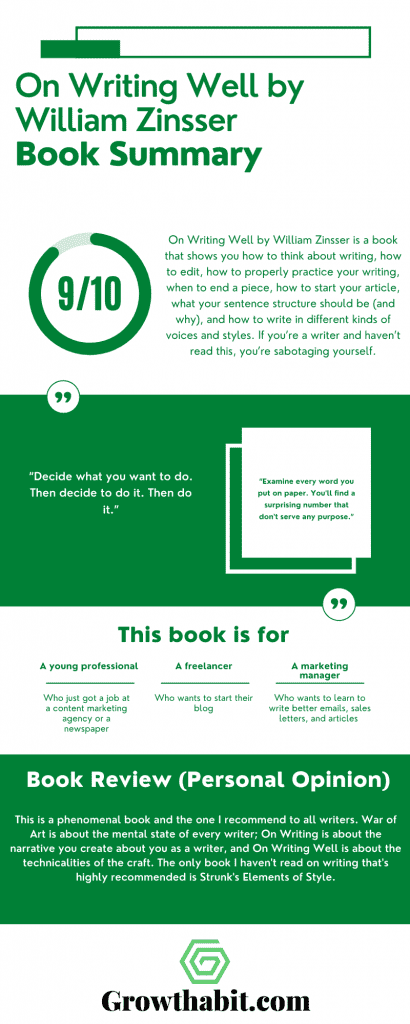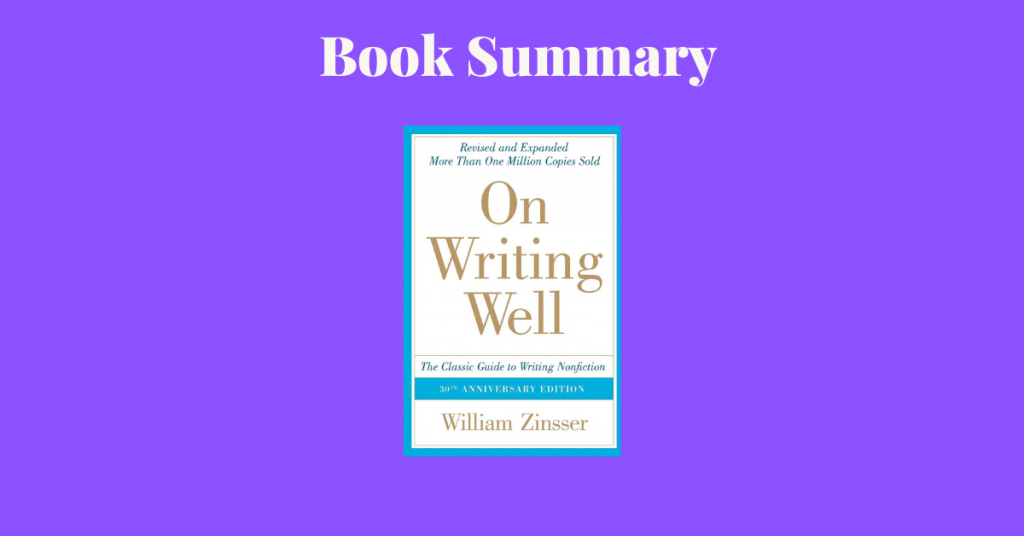On Writing Well by William Zinsser is a book that shows you how to think about writing, how to edit, how to properly practice your writing, when to end a piece, how to start your article, what your sentence structure should be (and why), and how to write in different kinds of voices and styles. If you’re a writer and haven’t read this, you’re sabotaging yourself.
Book Title: On Writing Well: The Classic Guide to Writing Nonfiction
Author: William Zinsser
Date of Reading: June, 2018
Rating: 9/10
What Is Being Said In Detail:
On Writing Well is divided into four major parts:
- Principles. Here, Zinsser talks about simplicity, style, removing clutter, target audience, and the usage of words (short, concise, clear, and humane)
- Methods. Methods is about unity (unity of tenses and pronouns), composing a great lead and realizing when you need to end the piece.
- Forms. Forms deals with writing people, places, and yourself. Also in forms, Zinsser tells us about business writing, sports, and humor.
- Attitudes. The last part of the book explains how to craft your voice, how to craft the perfect piece, and how to write as well as you can.
Most Important Keywords, Sentences, Quotes:
Introduction
“Writing is talking to someone else on paper.”
“The word processor made good writers better and bad writers worse.”
PART I Principles
“The words just flowed. It was easy. I then said that writing wasn’t easy and wasn’t fun . It was hard and lonely, and the words seldom just flowed.”
“Absolutely not, he said. “Let it all hang out,” he told us, and whatever form the sentences take will reflect the writer at his most natural. I then said that rewriting is the essence of writing. I pointed out that professional writers rewrite their sentences over and over and then rewrite what they have rewritten.”
“I then said that the professional writer must establish a daily schedule and stick to it. I said that writing is a craft, not an art, and that the man who runs away from his craft because he lacks inspiration is fooling himself. He is also going broke.”
“I said that professional writers are solitary drudges who seldom see other writers.”
“writing could be easy. Maybe I should take up surgery on the side.”
“It’s not necessary to want to spend a year alone at Walden Pond to become involved with a writer who did.”
“Can such principles be taught? Maybe not. But most of them can be learned.”
“But the secret of good writing is to strip every sentence to its cleanest components. Every word that serves no function, every long word that could be a short word, every adverb that carries the same meaning that’s already in the verb, every passive construction that leaves the reader unsure of who is doing what— these are the thousand and one adulterants that weaken the strength of a sentence. And they usually occur in proportion to education and rank”
“Franklin D. Roosevelt when he tried to convert into English his own governments memos, such as this blackout order of 1942: Such preparations shall be made as will completely obscure all Federal buildings and non-Federal buildings occupied by the Federal government during an air raid for any period of time from visibility by reason of internal or external illumination . “Tell them,” Roosevelt said, “that in buildings where they have to keep the work going to put something across the windows.”
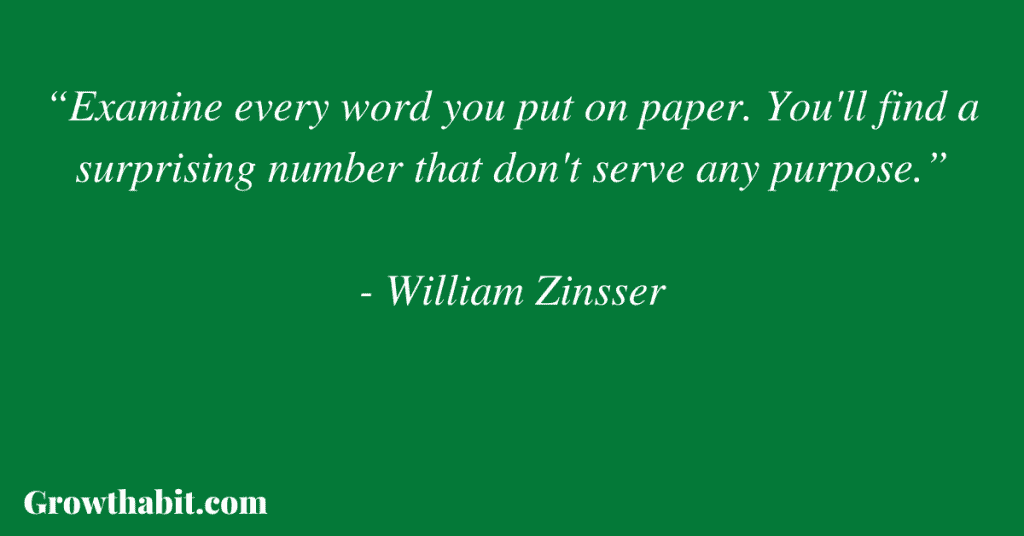
“Writing is hard work. A clear sentence is no accident. Very few sentences come out right the first time, or even the third time. Remember this in moments of despair. If you find that writing is hard, it’s because it is hard.”
“Clutter is the laborious phrase that has pushed out the short word that means the same thing. Even before John Dean, people and businesses had stopped saying “now.” They were saying ”currently” (“all our operators are currently busy”), or “at the present time,” or “presently” (which means “soon”). Yet the idea can always be expressed by “now” to mean the immediate moment (“Now I can see him”), or by “today” to mean the historical present (“Today prices are high”), or simply by the verb “to be” (“It is raining”). There’s no need to say, “At the present time we are experiencing precipitation. “
“Clutter is the ponderous euphemism that turns a slum into a depressed socioeconomic area, garbage collectors into waste disposal personnel and the town dump into the volume reduction unit.”
”political speech and writing are largely the defense of the indefensible . …”
“The point of raising it now is to serve notice that clutter is the enemy. Beware, then, of the long word that’s no better than the short word: “assistance” (help), “numerous” (many), “facilitate” (ease), “individual” (man or woman), “remainder ” (rest), “initial” (first), “implement” (do), “sufficient” (enough), “attempt ” (try), “referred to as” (called) and hundreds more.”
“Don’t inflate what needs no inflating: “with the possible exception of” (except), “due to the fact that” (because), “he totally lacked the ability to” (he couldn’t), “until such time as” (until), “for the purpose of” (for).”
“Often just one word got bracketed: the unnecessary preposition appended to a verb (“order up”), or the adverb that carries the same meaning as the verb (“smile happily”), or the adjective that states a known fact (“tall skyscraper”) .”
“Entire paragraphs were bracketed. But soon the students learned to put mental brackets around their own clutter, and by the end of the term their papers were almost clean. Today Many of those students are professional writers, and they tell me, “I still see your brackets—they’re following me through life.”
“If you give me an eight-page article and I tell you to cut it to four pages, you’ll howl and say it can’t be done. Then you’ll go home and do it, and it will be much better. After that comes the hard part: cutting it to three.”
“The reader will notice if you are putting on airs. Readers want the person who is talking to them to sound genuine. Therefore a fundamental rule is: be yourself.”
“have a somewhat human quality, and by Paragraph 4 you begin to sound like yourself. You’ve started to relax. It’s amazing how often an editor can throw away the first three or four paragraphs of an article, or even the first few pages, and start with the paragraph where the writer begins to sound like himself or herself.”
”I’ll never forget the day when I…” I think, “Aha! A person!”
“I also sympathize with teachers who don’t want to give students an easy escape into opinion—” I think Hamlet was stupid”—before they have grappled with the discipline of assessing a work on its merits and on external sources. “I” can be a self-indulgence and a cop-out.”
“Sell yourself, and your subject will exert its own appeal. Believe in your own identity and your own opinions. Writing is an act of ego, and you might as well admit it. Use its energy to keep yourself going.”
“You are writing primarily to please yourself, and if you go about it with enjoyment you will also entertain the readers who are worth writing for. If you lose the dullards back in the dust, you don’t want them anyway.”
“I’m talking about two different issues. One is craft, the other is attitude . The first is a question of mastering a precise skill. The second is a question of how you use that skill to express your personality.”
“Obviously I enjoyed making a certain arrangement of my ruffians and riff raff, my hooligans and hoodlums, and my readers enjoyed it too—far more than if I had provided a mere list. They enjoyed not only the arrangement but the effort to entertain them. They weren’ t enjoying it, however, with their eyes. They were hearing the words in their inner ear.”
PART II Methods
“You learn to write by writing. It’s a truism, but what makes it a truism is that it’s true. The only way to learn to write is to force yourself to produce a certain number of words on a regular basis.”
“If you went to work for a newspaper that required you to write two or three articles every day, you would be a better writer after six months.”
“One choice is unity of pronoun. Are you going to write in the first person, as a participant, or in the third person, as an observer?”
“Unity of tense is another choice. Most people write mainly in the past tense”
“What is not agreeable is to switch back and forth.”
“But you must choose the tense in which you are principally going to address the reader, no matter how many glances you may take backward or forward along the way.”
“Both tones are acceptable. In fact, any tone is acceptable. But don’t mix two or three.”
“For example: “In what capacity am I going to address the reader?” (Reporter? Provider of information? Average man or woman?) “What pronoun and tense am I going to use?” “What style?” (Impersonal reportorial? Personal but formal? Personal and casual?) “What attitude am I going to take toward the material?” (Involved? Detached? Judgmental? Ironic? Amused?) “How much do I want to cover?” “What one point do I want to make?”
“writing—to make their article the last word. It’s a commendable impulse, but there is no last word. What you think is definitive today will turn undefinitive by tonight, and writers who doggedly pursue every last fact will find themselves pursuing the rainbow and never settling down to write.”
“every successful piece of nonfiction should leave the reader with one provocative thought that he or she didn’t have before.”
“The most important sentence in any article is the first one. If it doesn’t induce the reader to proceed to the second sentence, your article is dead.”
“Therefore your lead must capture the reader immediately and force him to keep reading. It must cajole him with freshness, or novelty, or paradox, or humor, or surprise, or with an unusual idea, or an interesting fact, or a question. Anything will do, as long as it nudges his curiosity and tugs at his sleeve.”
“I’ve often wondered what goes into a hot dog. Now I know and I wish I didn’t.”
“One reason for citing this lead is to note that salvation often lies not in the writer’s style but in some odd fact he or she was able to discover.”
“But narrative is the oldest and most compelling method of holding someone’s attention; everybody wants to be told a story.”
“Sometimes you can tell your whole story in the first sentence .”
“Like the minister’s sermon that builds to a series of perfect conclusions that never conclude, an article that doesn’t stop where it should stop becomes a drag and therefore a failure.”
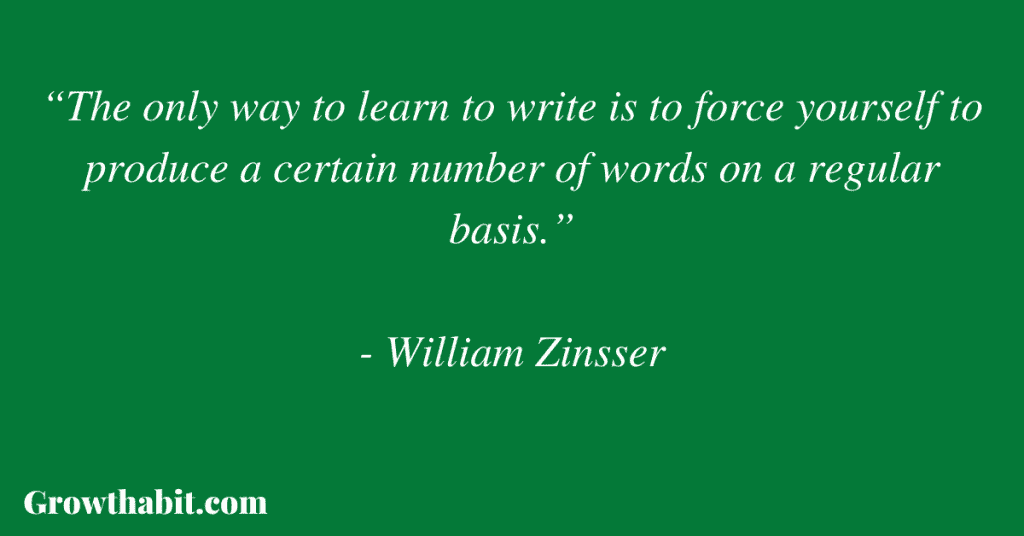
“The perfect ending should take your readers slightly by surprise and yet seem exactly right. They didn’t expect the article to end so soon, or so abruptly, or to say what it said. But they know it when they see it.”
“Something I often do in my own work is to bring the story full circle—to strike at the end an echo of a note that was sounded at the beginning .”
”Joe saw him” is strong. “He was seen by Joe” is weak. The first is short and precise; it leaves no doubt about who did what.”
“Of the 701 words in Lincoln’s Second Inaugural Address, a marvel of economy in itself, 505 are words of one syllable and 122 are words of two syllables.”
“Make active verbs activate your sentences, and try to avoid the kind that need an appended preposition to complete their work.”
“Don’t say that the president of the company stepped down. Did he resign? Did he retire? Did he get fired? Be precise. Use precise verbs.”
“don’t just go back to Hemingway or Thurber or Thoreau. I commend the King James Bible and William Shakespeare.”
“Don’t write that someone clenched his teeth tightly; there’s no other way to clench teeth .”
“Most adjectives are also unnecessary. Like adverbs, they are sprinkled into sentences by writers who don’t stop to think that the concept is already in the noun.”
“Prune out the small words that qualify how you feel and how you think and what you saw: “a bit,” “a little,” “sort of,” “kind of,” “rather,” “quite,” “very,” “too,” “pretty much,” “in a sense” and dozens more. They dilute your style and your persuasiveness.”
“Don’ t say you were a bit confused and sort of tired and a little depressed and somewhat annoyed. Be confused. Be tired. Be depressed. Be annoyed. Don’t hedge your prose with little timidities. Good writing is lean and confident.”
“Don’t tell us you were quite fortunate. How fortunate is that?”
“that predominates, and don’t tell me about Norman Mailer—he’s a genius. If you want to write long sentences, be a genius.”
“Humor is best achieved by understatement, and there’s nothing subtle about an exclamation point.”
“MOOD CHANGERS. Learn to alert the reader as soon as possible to any change in mood from the previous sentence. At least a dozen words will do this job for you: “but, ” “yet,” “however,” “nevertheless, ” “still,” “instead,” “thus,” “therefore, ” “meanwhile, ” “now,” “later,” “today,” “subsequently ” and several more.”
“Many of us were taught that no sentence should begin with “but.” If that’s what you learned, unlearn it—there’s no stronger word at the start.”
”Instead I took the train.” “Still I had to admire him.” “Thus I learned how to smoke.” “It was therefore easy to meet him.” “Meanwhile I had talked to John.”
“I only suggest avoiding one form—”I’d, ” “he’d,” “we’d,” etc.—because “I’d” can mean both “I had” and “I would,”
“Always use “that” unless it makes your meaning ambiguous. Notice that in carefully edited magazines, such as The New Yorker, “that” is by far the predominant usage. I mention this because it is still widely believed—a residue from school and college—that “which” is more correct, more acceptable, more literary. It’s not. In most situations, “that” is what you would naturally say and therefore what you should write.”
””Which” serves a particular identifying function, different from “that. ”
“Take the shoes that are in the closet.” This means: take the shoes that are in the closet, not the ones under the bed. (B) “Take the shoes, which are in the closet.” Only one pair of shoes is under discussion; the “which” usage tells you where they are. Note that the comma is necessary in B, but not in A.”
“Don’t overstate. You didn’t really consider jumping out the window. Life has more than enough truly horrible funny situations. Let the humor sneak up so we hardly hear it coming.”
“The same fear hobbles freelance writers, who see the work of other writers appearing in magazines while their own keeps returning in the mail. Forget the competition and go at your own pace. Your only contest is with yourself.”
“But don’t go berserk. A succession of tiny paragraphs is as annoying as a paragraph that’s too long.”
“You’ll find that almost all of them think in paragraph units, not in sentence units. Each paragraph has its own integrity of content and structure .”
”We ” is a handy replacement for “he.” “Our” and “the” can often replace “his.”
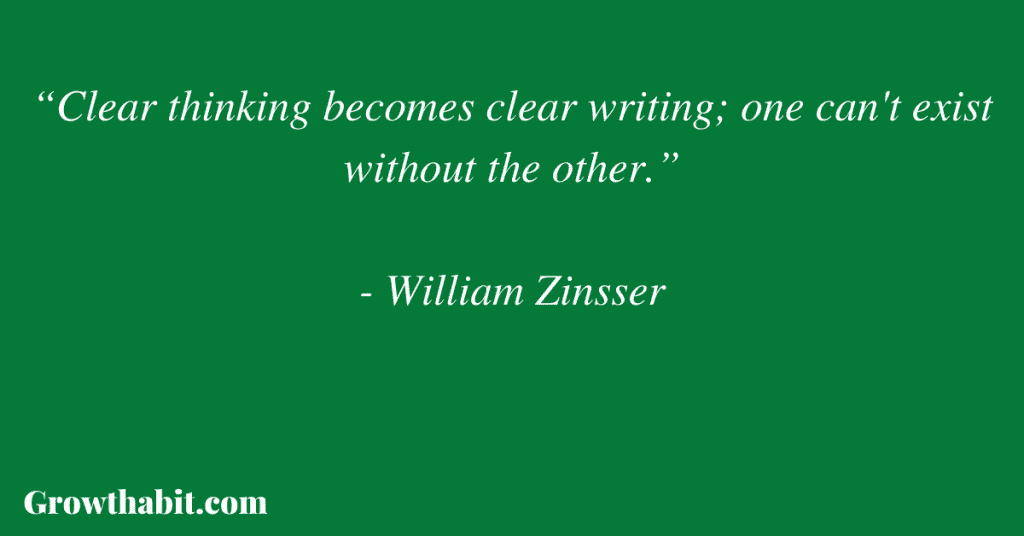
“One other pronoun that helped me in my repairs was “you.” Instead of talking about what “the writer” does and the trouble he gets into, I found more places where I could address the writer directly (“You’ll often find… “).”
“Many people assume that professional writers don’t need to rewrite; the words just fall into place. On the contrary, careful writers can’t stop fiddling.”
“Please—if you’re such a student—think of it as a gift. You won’t write well until you understand that writing is an evolving process, not a product. Nobody expects you to get it right the first time, or even the second time.”
“I don’t mean writing one draft and then writing a different second version, and then a third. Most rewriting consists of reshaping and tightening and refining the raw material you wrote on your first try.”
“I don’t like to write (I like to have written). But I love to rewrite. I especially like to cut: to press the DELETE key and see an unnecessary word or phrase or sentence vanish into the electricity.”
“TRUST YOUR MATERIAL. The longer I work at the craft of writing, the more I realize that there’s nothing more interesting than the truth. What people do—and what people say—continues to take me by surprise with its wonderfulness, or its quirkiness, or its drama, or its humor, or its pain”
“People of every age will write better and with more enjoyment if they write about what they care about.”
“No area of life is stupid to someone who takes it seriously. If you follow your affections you will write well and will engage your readers.”
PART III Forms
“But in fact the great preponderance of what writers now write and sell, what book and magazine publishers publish and what readers demand is nonfiction.”
“The only important distinction is between good writing and bad writing. Good writing is good writing, whatever form it takes and whatever we call it.”
“The article that records everything you did on your trip will fascinate you because it was your trip. Will it fascinate the reader?”
“Find details that are significant. They may be important to your narrative; they may be unusual, or colorful, or comic, or entertaining. But make sure they do useful work.”
“One of the richest travel books written by an American is Walden, though Thoreau only went a mile out of town.”
“Ego is healthy; no writer can go far without it. Egotism, however, is a drag, and this chapter is not intended as a license to prattle just for therapy.”
“Thoreau wrote seven different drafts of Walden in eight years; no American memoir was more painstakingly pieced together. To write a good memoir you must become the editor of your own life, imposing on an untidy sprawl of half-remembered events a narrative shape and an organizing idea. Memoir is the art of inventing the truth .”
“Some bats are sensitive enough to register a beetle walking on sand, and some can detect the movement of a moth flexing its wings as it sits on a leaf. That’s my idea of sensitive; I couldn’t ask a writer to give me two more wonderful examples. But there’s more to my admiration than gratitude. I also wonder: how many other examples of bat sensitivity did she collect—dozens? hundreds?—to be able to choose those two? Always start with too much material. Then give your reader just enough .”
“Only through clear writing by experts can the rest of us make educated choices as citizens in these areas where we have little or no education.”
“If you have to do any writing in your job, this chapter is for you.”
“my four articles of faith: clarity, simplicity, brevity, and humanity .”
“He says: “A computer is like a sophisticated pencil. You don’t care how it works, but if it breaks you want someone there to fix it.”
“The way to warm up any institution is to locate the missing “I.” Remember: “I” is the most interesting element in any story.”
“If you want to write about sports, remember that the men and women you’re writing about are doing something immensely difficult, and they have their pride. You, too, are doing a job that has its codes of honor. One of them is that you are not the story.”
“Those are the values to look for when you write about sport: people and places, time and transition.”
“Finally, don’t strain for laughs; humor is built on surprise, and you can surprise the reader only so often.”
”Humor can be dissected, as a frog can,” E. B. White once wrote, “but the thing dies in the process and the innards are discouraging to any but the pure scientific mind.”
”All humor must be about something—it must touch concretely on life,”
PART IV Attitudes
“Don’t alter your voice to fit your subject.”
“The common assumption is that the style is effortless. In fact the opposite is true: the effortless style is achieved by strenuous effort and constant refining”
“It’s a disciplined act of writing. The grammar is formal, the words are plain and precise, and the cadences are those of a poet”
“It’s condescending. (I stop reading writers who say “You see.”)”
“But readers will stop reading you if they think you are talking down to them. Nobody wants to be patronized .”
“For writers and other creative artists, knowing what not to do is a major component of taste.”
“Never hesitate to imitate another writer. Imitation is part of the creative process for anyone learning an art or a craft.”
“After verbs, plain nouns are your strongest tools; they resonate with emotion.”
“There are some writers who sweep us along so strongly in the current of their energy—Norman Mailer, Tom Wolfe, Toni Morrison, William F. Buckley, Jr., Hunter Thompson, David Foster Wallace—that we assume that when they go to work the words just flow. Nobody thinks of the effort they make every morning to turn on the switch. You also have to turn on the switch. Nobody is going to do it for you.”
”Dying is no big deal. Living is the trick.”
“If you want your writing to convey enjoyment, write about people you respect.”
”How can I sell my writing? ” It’s the only question I won’t try to answer, partly because I’m not qualified—I have no idea what editors in today’s market are looking for; I wish I did. But mainly it’s because I have no interest in teaching writers how to sell. I want to teach them how to write. If the process is sound, the product will take care of itself, and sales are likely to follow.”
“But nobody can write an article about the disappearance of small towns in Iowa; it would be all generalization and no humanity. The writer would have to write about one small town in Iowa and thereby tell her larger story, and even within that one town she would have to reduce her story still further: to one store, or one family, or one farmer. We talked about different approaches, and the writer gradually thought her story down to human scale.”
“A man would say that he wanted to try a piece about the town where he lived and would venture a possible approach: “I could write about X.” X, however, was uninteresting, even to him, lacking any distinctiveness, and so were Y and Z, and so were P and Ç and R, the writer continuing to dredge up fragments of his life, when, almost accidentally, he stumbled into M, a long-forgotten memory, seemingly unimportant but unassailable true, compressing into one incident everything that had made him want to write about the town in the first place. “There’s your story,” several people in the class would say, and it was. The student had been given time to find it.”
“Figure out what you want to do and how you want to do it, and work your way with humanity and integrity to the completed article. Then you’ll have something to sell.”
“When we say we like a writer’s style, what we mean is that we like his personality as he expresses it on paper.”
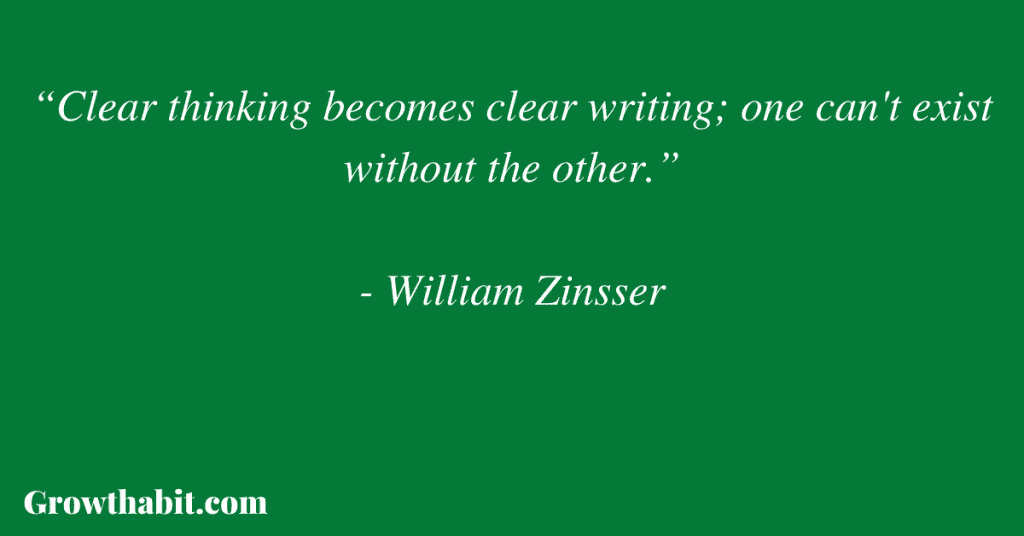
“We know that verbs have more vigor than nouns, that active verbs are better than passive verbs, that short words and sentences are easier to read than long ones, that concrete details are easier to process than vague abstractions.”
“Add a few points for such natural gifts as a good musical ear, a sense of rhythm and a feeling for words.”
“If you would like to write better than everybody else, you have to want to write better than everybody else. You must take an obsessive pride in the smallest details of your craft. And you must be willing to defend what you’ve written against the various middlemen—editors, agents and publishers—whose sights may be different from yours, whose standards not as high.”
“Yet to defend what you’ve written is a sign that you are alive. I’m a known crank on this issue—I fight over every semicolon. But editors put up with me because they can see that I’m serious.”
“But finally the purposes that writers serve must be their own. What you write is yours and nobody else’s. Take your talent as far as you can and guard it with your life. Only you know how far that is; no editor knows. Writing well means believing in your writing and believing in yourself, taking risks, daring to be different, pushing yourself to excel. You will write only as well as you make yourself write.”
Book Review (Personal Opinion):
This is a phenomenal book and the one I recommend to all writers. War of Art is about the mental state of every writer; On Writing is about the narrative you create about you as a writer, and On Writing Well is about the technicalities of the craft. The only book I haven’t read on writing that’s highly recommended is Strunk’s Elements of Style.
Rating: 9/10
This Book Is For (Recommend):
- A young professional who just got a job at a content marketing agency or a newspaper
- A freelancer who wants to start their blog
- A marketing manager who wants to learn to write better emails, sales letters, and articles
If You Want To Learn More
Here’s an interesting discussion on research on writing.
50 Years of Research on Writing: What Have We Learned?
How I’ve Implemented The Ideas From The Book
This is a difficult book to implement because you need to [really] deliberate in its implementation. The one thing I found out is to read the draft out loud and notice how it sounds. You can spot clutter easily when you read it out loud and then remove the clutter from your writing.
One Small Actionable Step You Can Do
Go over your writings and exchange the big words for small words that have the same meaning:
“assistance” (help), “numerous” (many), “facilitate” (ease), “individual” (man or woman), “remainder ” (rest), “initial” (first), “implement” (do), “sufficient” (enough), “attempt ” (try), “referred to as” (called) and hundreds more.”
